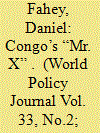| Srl | Item |
| 1 |
ID:
145616


|
|
|
|
|
| Summary/Abstract |
When Daniel Fahey visited eastern Democratic Republic of Congo as coordinator of the U.N.’s Group of Experts, he found a charismatic charlatan known as “Mr. X” under the protection of the U.N. A star witness in a murder trial, Mr. X had convinced the U.N. of his tall tales. Fahey shows how Mr. X’s story sheds light on the emerging role of intelligence in peacekeeping operations and the unpredictable effects of its failures.
|
|
|
|
|
|
|
|
|
|
|
|
|
|
|
|
| 2 |
ID:
148460


|
|
|
|
|
| Summary/Abstract |
This article discusses the case of the Allied Democratic Forces (ADF) rebel group in the Democratic Republic of Congo (DRC). It shows how a variety of actors that have opposed the ADF group have framed the rebels to achieve a range of political and economic objectives, or in response to organizational and individual limitations. The DRC and Ugandan governments have each framed ADF in pursuit of regional, international and national goals separate from their stated desires to eliminate the armed group. The UN stabilization mission in Congo's (MONUSCO) understanding of the ADF was influenced by organizational limitations and the shortcomings of individual analysts, producing flawed assessments and ineffective policy decisions. Indeed, the many ‘faces’ of ADF tell us more about the ADF's adversaries than they do about the rebels themselves. The article shows how the policies towards the ADF may not be directly related to defeating a rebel threat, but rather enable the framers (e.g. DRC and Ugandan governments) to pursue various political and economic objectives, or lead the framers to pursue misguided operational plans (e.g. MONUSCO). In doing so, the article highlights more broadly the importance of the production of knowledge on conflicts and rebel groups: the way in which a rebel group is instrumentalized, or in which organizational structure impact on the understanding of the rebel group, are crucial not only in understanding the context, but also in understanding the interventions on the ground.
|
|
|
|
|
|
|
|
|
|
|
|
|
|
|
|